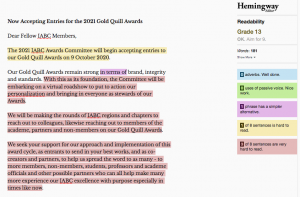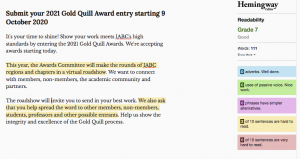Plain language can save lives or make them harder, as the Center for Plain Language noted on Twitter this week. The occasion: International Plain Language Day (Oct. 13).
We were disappointed with many of the results of the Federal Plain Language Report Card this year.
As we celebrate #plainlanguageday we are reminded that the way we communicate can save lives or make them harder. @washingtonpost @nytimes @politico pic.twitter.com/BbF4Qr0wjz
— Center for Plain Language (@plain_language) October 13, 2020
What an appropriate time to look at how well an association of people who communicate for a living delivers “plain.” Yes, I’m talking about IABC, the International Association of Business Communicators.
In this situation, IABC isn’t going to endanger any lives, but the group certainly didn’t make life any easier (or clearer) with a convoluted email message announcing that entries to the 2021 Gold Quill Awards are now being accepted.
According to plainlanguage.gov, material is in plain language if your audience can:
- Find what they need
- Understand what they find the first time they read or hear it
- Use what they find to meet their needs.
Techniques include using:
- “You” and other pronouns
- Active voice, not passive
- Short sentences and paragraphs
- Common, everyday words.
The IABC message was confusing, so as I often do with such messages, I checked its readability through the Hemingway app.
I’ll spare you the full analysis of each section, although let me know if you’d like to see the full before and after. The entire message came in at a Grade 11 level, whereas experts recommend a Grade 9 level for better understanding (especially when you know readers are busy, impatient people). Of 29 sentences, 11 were VERY hard to read and two simply hard to read. Three phrases had simpler options and the message used the passive voice five times.
Let’s take a closer look at the opening, since this is what will grab the reader, or not. The warning swath of pinky-red below indicates each sentence is “so dense and complicated that your readers will get lost trying to follow its meandering, splitting logic.”

While presumably directed to IABC members, the word “you” never appears. “Your” only shows up in the fourth paragraph, twice. The focus is not the reader, but the IABC Awards Committee, right from the subject line: Now Accepting Entries for the 2021 Gold Quill Awards.
I don’t even know the meaning of several sentences:
- “Our Gold Quill Awards remain strong in terms of brand, integrity and standards.”
- “…to put to action our personalization”
- “…bringing everyone in as stewards of our Awards”
- “…who can all help make many more experience our IABC excellence with purpose”
I took a stab at a more reader-friendly rewrite, including shorter, more familiar words and shorter sentences. I also began with a more reader-centric subject line and opening:

The message would benefit from more detail about what the roadshow involves – maybe workshops to help people polish their entries? Or displays of winning entries from previous years? Entry templates? I have no idea.
Other parts of the message repeated some of the “roadshow” information, which I removed. There’s a new COVID-19 category, which might or might not stick around for three years. (Why mention that possibility at all? It will simply appear in future programs, or not.) I simplified the other points and took out buzzwords like “ramp up.” There was some mention of the need for a “global village,” which might have made more sense explaining the need for a virtual roadshow.
My full rewrite came in at an easy-to-read Grade 7 level. Of 36 (shorter) sentences, none were VERY hard to read and six were hard to read due to length (although still only about 18 words). No phrases had simpler options and the passive voice did not appear.
If I wasn’t just doing this for fun, I would go through the rewrite again just to check for how well it hangs together, reorganize or remove any repetition. Anyone sending a mass email might also run it by a few other people before hitting “send,” to check that it all makes sense.
The exercise is a reminder that when you deal with words, think about what’s in it for your reader. How easily can they figure that out? Can they tell what’s most important? Is any of it confusing? What do you want readers to think or do after reading your message? Is it obvious?
Note: Subsequent messages from IABC said it more plainly than that first email:
On Twitter: “IABC is now accepting entries for the 2021 Gold Quill Awards! You have done outstanding work in your role as a communicator in the face of extending uncertainty. Learn more and submit your work for the recognition it deserves.” (I’d still start with “You” and the second sentence.)
In an emailed bulletin: “Start Your Award-winning Entry Now! For more than 40 years, IABC’s Gold Quill Awards have recognized and awarded excellence in strategic communication worldwide. We are excited to announce that you can now submit your entries for 2021 and with an updated process that’s easier than ever before!” (Do we really need to be “excited”? How about just, “You can now…”?)
Oh, and an easier process? That seems like something that should have been in the first email.
What do you think?
Related reading:
9 steps to readable writing, with turtles
A closer look at how to make complex writing more readable
